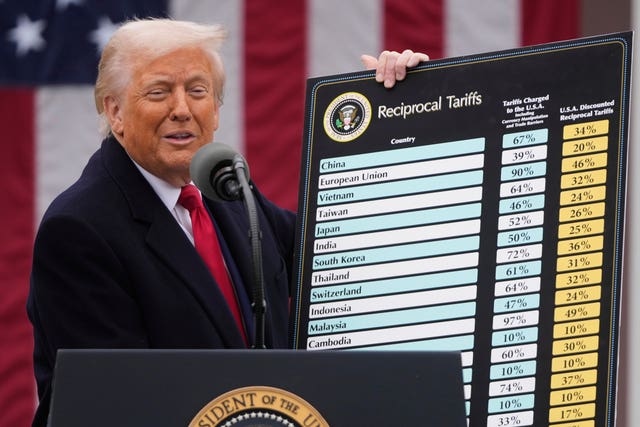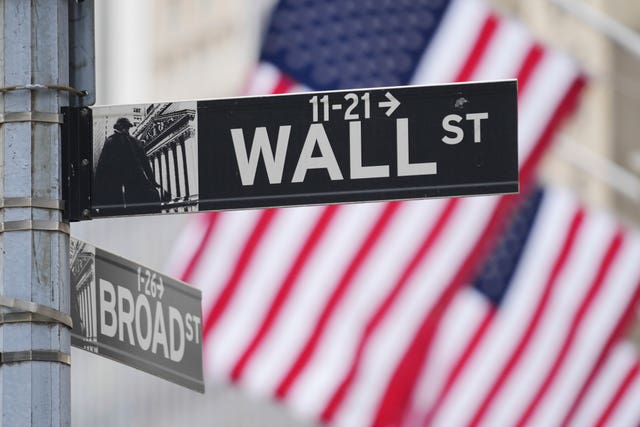Trump hits UK with 10% tariff and sets blanket 25% rate for foreign cars
US president Donald Trump believes putting the levies on imports of foreign goods will protect American businesses.

Donald Trump slapped a 10% tariff on US imports of UK goods as he set out sweeping trade levies hitting countries across the world.
The US president said his “liberation day” announcement was a “declaration of economic independence”.
Mr Trump confirmed that from midnight in Washington, 5am Thursday in the UK, a 25% tariff would be imposed on all foreign cars imported to the US – a move which experts fear could cost 25,000 jobs in the British car industry.
And he indicated tariffs of 10% would apply to other products from the UK – the same level as the global “baseline” he was setting for countries around the world as part of his “reciprocal” measures from 5am on Saturday.

Other blocs with higher tariffs on US goods were hit with tougher import taxes by Mr Trump – for the European Union, which he said would attract a 20% rate.
The president also hit out at “exorbitant” VAT rates, which he views as a barrier to US firms seeking to sell into markets such as the UK where the taxes apply.
Speaking in the White House rose garden, Mr Trump said: “April 2, 2025 will forever be remembered as the day American industry was reborn, the day America’s destiny was reclaimed, and the day that we began to make America wealthy again.”
Sir Keir Starmer’s Government had been lobbying to be spared the tariffs and hopes to strike an economic deal with the White House which will mitigate the impacts.
But Chancellor Rachel Reeves acknowledged the UK would not be “out of the woods” even if a deal could be reached with Mr Trump because of the global economic storm the president’s measures will unleash.
The US dollar dropped sharply against key currencies when Mr Trump began his speech on Wednesday evening, but started to ease back as the president unveiled his full range of tariffs.
The American currency fell by as much as 1% against the euro shortly after 9pm, but settled at around 0.6% lower once the announcement ended.
The dollar was moving around 0.5% down against the pound.

Mr Trump said: “This is one of the most important days in my opinion in American history.
“It’s our declaration of economic independence.”
Setting out his measures he said the US had “slashed our trade barriers on other countries while those nations placed massive tariffs on our products and created outrageous non-monetary barriers to decimate our industries.
“And in many cases, the non-monetary barriers were worse than the monetary ones.
“They manipulated their currency, subsidised their exports, stole our intellectual property, imposed exorbitant VAT taxes to disadvantage our products, adopted unfair rules and technical standards and created filthy pollution havens.”
The new measures will remain in place indefinitely, until Mr Trump decides “the threat posed by the trade deficit and underlying nonreciprocal treatment is satisfied, resolved, or mitigated”, the White House said.
Analysis from the Institute for Public Policy Research (IPPR) suggested the tariffs on car imports would put 25,000 UK jobs at risk and “completely destabilise the UK car manufacturing industry”.
The 25% rate on cars had already been expected, but the 10% reciprocal tariff was lower than had been feared with suggestions Mr Trump could have set it at 20%, the same level as VAT.
A Downing Street source said: “We don’t want any tariffs at all, but a lower levy than others vindicates our approach.
“It matters because the difference between 10% and 20% is thousands of jobs.
“We will keep negotiating, keep cool and keep calm. We want to negotiate a sustainable trade deal, and of course to get tariffs lowered. Tomorrow we will continue with that work.”
No immediate retaliatory measures are expected from the Government as it focuses on trying to strike the hoped-for economic deal with the US.
Business Secretary Jonathan Reynolds said “nothing is off the table”, but “nobody wants a trade war” with the US.
“We will always act in the best interests of UK businesses and consumers,” he said.
“That’s why, throughout the last few weeks, the Government has been fully focused on negotiating an economic deal with the United States that strengthens our existing fair and balanced trading relationship.
“The US is our closest ally, so our approach is to remain calm and committed to doing this deal, which we hope will mitigate the impact of what has been announced today.
“We have a range of tools at our disposal and we will not hesitate to act.
“We will continue to engage with UK businesses including on their assessment of the impact of any further steps we take.
“Nobody wants a trade war and our intention remains to secure a deal. But nothing is off the table and the Government will do everything necessary to defend the UK’s national interest.”
Confederation of British Industry chief Rain Newton-Smith said: “Business has been clear: there are no winners in a trade war.
“Today’s announcements are deeply troubling for businesses and will have significant ramifications around the world.
“A cool and calm reaction from the UK Government is the right response: UK firms need a measured and proportionate approach which avoids further escalation.”
Shadow trade secretary Andrew Griffith said: “This is disappointing news which will worry working families across the country.
“Labour failed to negotiate with President Trump’s team for too many months after the election, failed to keep our experienced top trade negotiator, and failed to get a deal to avoid the imposition of these tariffs by our closest trading partner.”
He said the “silver lining” was that the UK faced lower tariffs than the EU – a “Brexit dividend that will have protected thousands of British jobs and businesses”.
But Liberal Democrat leader Sir Ed Davey said: “The Prime Minister should bring our Commonwealth and European partners together in a coalition of the willing against Trump’s tariffs, using retaliatory tariffs where necessary and signing new trade deals with each other where possible.
“If the Government gives in to Trump’s threats, it will only encourage him to use the same bullying tactics again and again.”





